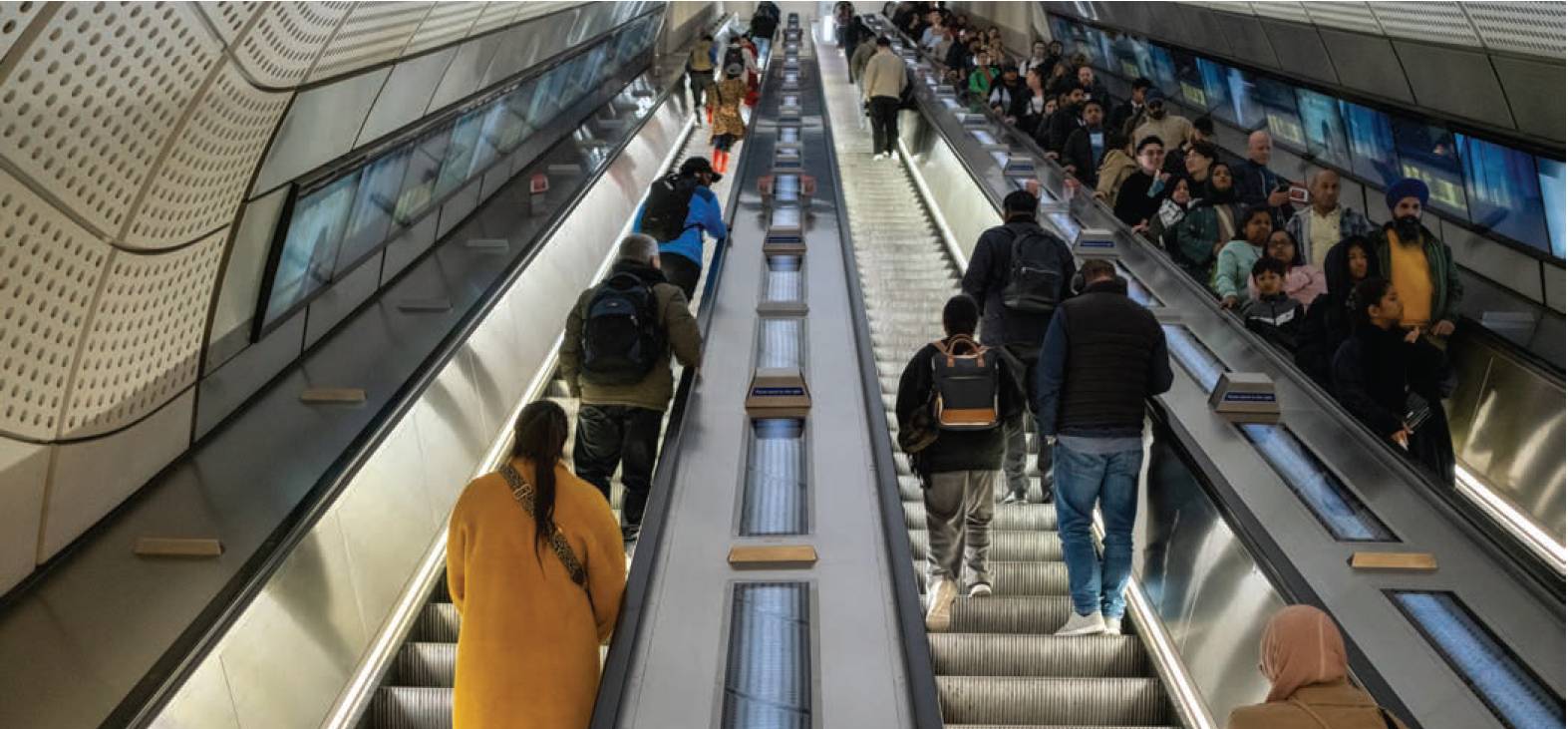
DO WE NEED TO THINK AND TALK MORE POSITIVELY ABOUT PROGRESS?
I am not going to dismiss the genuine concerns people have about global security. However, I would like to begin by highlighting the important roles positivity, pragmatism and determinedness have played in helping humanity to face down our fears and deliver more of the progress we need.
I’d like to start by talking about the 1960s. As well as being the year that Bryan Adam’s fingers bled on his first real six-string, 1969 also saw the birth of the Chartered Institution of Civil Engineering Surveyors. In the final year of the 1960s, both national and international engineers were able to celebrate some incredible achievements. These included the completion of the Victoria Line, the first entirely new underground line in London for 50 years, the first flight of Concorde, the world’s first supersonic passenger plane; and the first manned landing on the moon.
In the UK, the swinging ’60s is remembered as a time when the nation felt a sense of optimism and hedonism based on the liberalisation of culture and society, which manifested itself in the incredible music, film and fashion Britain produced at the time. However, when looking back at the decade in which colour TV first appeared in the UK, it feels appropriate to say that history is rarely this black and white. The 1960s was also a time of great fear and foreboding, which included incidents such as the Cuban Missile Crisis, the US stock market’s Flash Crash of 1962, the assassination of President Kennedy, the deployment of more than half a million US military personnel to Vietnam and the creation of the Berlin Wall, which led to the forced separation of one of Europe’s largest capital cities.
In the UK, the nation was rocked by the worst mining-related disaster in British history at Aberfan in Wales which resulted in 144 deaths in 1966 and the national tensions that dogged the decade and culminated in Enoch Powell’s infamous Rivers of Blood speech in 1968. While the Cold War and the Vietnam War provided a bleak backdrop to the 1960s, the world was also hit by a series of black swan events which delivered significant shocks to the economy, the environment and people’s sense of safety.
However, despite the uncertainty, people worked together to face down the dangers of the time and deliver new feats of engineering and progression. Out of all the achievements of that decade, perhaps President Kennedy’s 1961 speech to a joint session of the US Congress was the best galvanising force towards a single goal. He uffered the lines: “I believe that this nation should commit itself to achieving the goal, before this decade is out, of landing a man on the moon and returning him safely to the Earth.”
Despite the uncertainty of the 1960s, people worked together to face down the dangers of the time and deliver new feats of engineering and progression.
Project Apollo became the largest US technology project in the nation’s history, surpassing the Panama Canal and the Manhattan Project. Kennedy’s ‘urgent national needs’ speech set in motion a programme that at one time employed 400,000 people to ultimately achieve the goal of landing a man on the moon on July 20, 1969.
John Burn-Murdoch, the Financial Times’ chief data reporter, has touched on the theme of the importance of language and how it impacts human achievement. Last January, he published a fascinating data piece entitled: Is the West talking itself into decline?1
In the piece, he highlights how the industrial revolution was one of the most important events in human history and that how, over a handful of decades, technological breakthroughs kicked economic output off its centuries-long low plateau and sent populations, living standards and life expectancy soaring.
While there are different theories about how and why the Industrial Revolution began in Britain in the middle of the 18th century, Burn-Murdoch highlights the theory put forward by economic historian Joel Mokyr in his 2016 book A Culture of Growth.
Mokyr argues that broader cultural change laid the groundwork for the industrial revolution with leading British thinkers of the time, including Francis Bacon and Isaac Newton championing a progress-oriented view of the world, centred on the idea that science and experimentation were key to increasing human wellbeing. Burn-Murdoch highlights that new evidence has lent more credence to Mokyr’s theory. Working together, a team of four economists analysed the contents of 173,031 books printed in England between 1500 and 1900 to identify how the frequency of different terms being expressed in written language changed over time. The quartet found a marked increase in the use of terms related to progress and innovation starting in the early 17th century.
Having been faced with mainly negative media stories about HS2 over the past 15 or so years, more members of the public have tended to oppose the construction of Europe’s largest infrastructure project in the UK than support it.
Burn-Murdoch then adapted and extended this analysis to look at Spain, which was economically competitive with Britain at the start of the 17th century but then fell behind in the mid-to-late 17th century. Britain accelerated away during the Industrial Revolution.
Burn-Murdoch explains how, by using data from millions of books digitised as part of the Google Ngram project, he found the upsurge in discussions of progress in British books occurs about two centuries before the same uptick in Spain, mirroring trends in the countries’ economic development.
Burn-Murdoch then extends his analysis further to the 20th and 21st centuries, where the frequency of terms related to progress, improvement and the future drops by about 25% since the 1960s, while those related to threats, risks and worries become several times more common.
Burn-Murdoch cautions people welcoming less growth and economic advancement as a sign of increasing environmental sustainability. He argues that, as well as economic growth, the drive for progress brought us modern medicine, significantly longer and healthier lives, plentiful food supplies, dramatic reductions in poverty and ever more and ever cheaper renewable energy. The challenges facing the modern world, he argues, will be solved by more focus on progress, not less. I think there is more recent data which backs up this point further. The language that people read, hear and use is an excellent barometer of their opinion of the world. A fascinating Harris poll ahead of the US election highlights this point well. In May 2024, nearly three in five Americans wrongly believed the US was in an economic recession, despite the US economy adding 272,000 jobs in May 2024.
Meanwhile, almost half (49%) believed unemployment was at a 50-year high, when in fact the unemployment rate had been under 4%, a near 50-year low. What people hear and read influences how they think and how they behave.
New infrastructure improves people’s lives and unlocks progress. Without making light of the threats facing global security, it is important for us as a sector to face down the fears and carry on designing, building and championing the projects that society needs.
As people in the west read and hear more about threats and risks, it worries me that this language is also harming progress of infrastructure. Having been faced with mainly negative media stories about HS2 over the past 15 or so years, more members of the public have tended to oppose the construction of Europe’s largest infrastructure project in the UK than support it. However, when people experience new infrastructure for themselves, such as a new railway, new airport or new stadium, people tend to be supportive.
While people were understandably concerned that London’s new Elizabeth Line (pictured below) arrived three and a half years late and nearly £4bn over budget, it is very heartening to see the public’s response to the line now that it is open.

The original projections for the line forecast 150 million journeys a year by 2030. However, actual ridership for the Elizabeth Line has already shattered this forecast, with 210 million journeys taken in the last financial year, 40% higher than had been forecast to be the case six years later.
Other economic benefits of the Elizabeth Line2 include:
- An estimated £42bn boost to the UK’s economy
- A direct impact on the development of 55,000 new homes
- About 378,000 jobs created between 2015 and 2022.
In November of last year, I wrote a piece for CICES about the need for us as a sector to do more to celebrate successful projects like the TransPennine Route Upgrade, Heathrow Airport, the Metrolink Airport extension in Manchester and the Edinburgh Trams extension to Newhaven3. This year, I am going to be more bullish and actively champion for future infrastructure projects.
New infrastructure improves people’s lives and unlocks progress. Without making light of the threats facing global security, it is important for us as a sector to face down the fears and carry on designing, building and championing the projects that society needs. There has rarely been a time in history where there has been a greater need to deliver beneficial new infrastructure.
---
1 https://www.ft.com/content/e577411e-3bf2-4 fb4-872a-8b7d5e9139d3